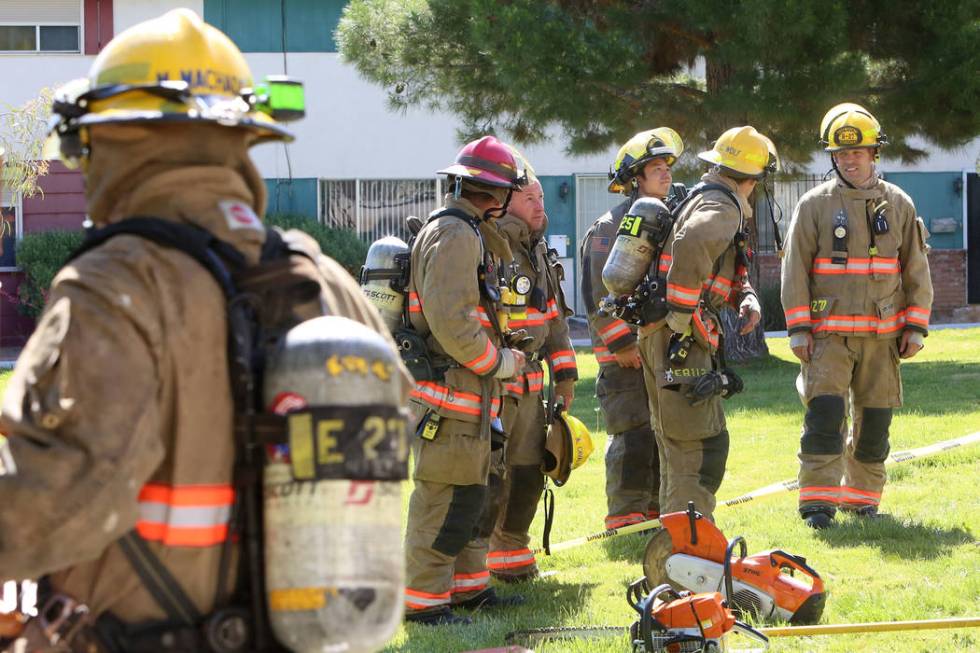Overtime pushes hundreds of Clark County salaries past $100K

More than 1,400 Clark County employees made over $100,000 last year, nearly double the county’s median annual household income in 2015.
A big chunk of the big salaries went to members of the fire department — which doled out millions of dollars in overtime pay and had about 540 six-figure earners. That was more than 70 percent of the department.
Nearly 1 in 5 full-time county employees made more than $100,000 in 2016, with median earnings for full-time employees at about $62,400, according to a Las Vegas Review-Journal analysis of the payroll data released last month.
The data did not include Metropolitan Police Department or University Medical Center employees.
In comparison, median earnings for full-time employees of private, for-profit companies in Clark County were about $37,400 in 2015, according to the latest U.S. Census Bureau estimates. The median household income was about $51,600.
Despite the disparity, the county asked state lawmakers to change to Nevada’s property tax cap laws, warning that tax revenue growth is in danger of falling behind an increased demand for services.
But Robert Fellner, with the conservative think tank Nevada Policy Research Institute, scoffed at that request because salary and benefits make up about 60 percent of the county’s operating budget.
“It’s absurd that local governments, whose workers on average make much more than private workers, want to further raise taxes to sustain out of control wage and benefits,” he said.
More spending due
The county paid $764.5 million in salary and benefits in 2016, 12 percent more than in 2011. Annual county revenue has grown 16.7 percent since the 2011-12 fiscal year.
County manager Yolanda King said salary payments will increase as the county — which has added 184 full-time positions since 2011 — reverses cuts to staff and pay made during the Great Recession.
King added that a vast majority of full-time county employees, about 90 percent, have been guaranteed annual raises in recent years because they belong to a union. But, she said, the county has effectively halved the cost of living increases it offers to both unionized and non-unionized employees since the Recession. Last year the cost-of-living increase was between 1.5 and 2 percent for all employees, she said.
King, who made about $253,000 in 2016, said it would be unreasonable for the county to keep employee salaries flat.
“Our employees are like any other person who works in the private industry. They have increased costs of living,” she said. “There’s a certain level of operating and maintenance costs we have, and that includes our people.”
Overtime
Clark County paid about $26.7 million in overtime in 2016 — with about $11 million covering the approximately 232,000 hours needed by the fire department.
Fire Chief Greg Cassell, who made $181,000 last year and is not eligible for overtime, said most of the hours were used to fill vacations.
“When someone takes a day off or they can’t make it to work for some reason, we have to put somebody in that spot,” Cassell said. “If we start decreasing staff or shutting down rigs to save overtime, our service would decrease in certain areas of town and that would affect our response time and ultimately affect the safety of our citizens.”
On average, full-time fire department employees earned $15,000 in overtime last year. Three employees — two firefighters and a captain — made four times that.
While the fire department has about 60 reserve employees whose role is to temporarily replace employees who are off work, Cassell said that’s not enough to cover all the gaps.
County Commission Chairman Steve Sisolak said that shows him it’s time to bolster the fire department.
“The time has come where you need to look at the cost-benefit ratio of paying this overtime or hiring new people,” he said. “We’ve hired more Metro (police) officers … it’s time we come back and look at hiring more fire department staff.”
Cassell pointed to a steady stream of retirements — about 35 last year — and the 22 to 24 weeks it takes to get a new recruit in the field, as a challenge in meeting staffing needs
“We know overtime is never going to go away in our industry. We’re working 24 hours,” he said. “Having extra people just doesn’t exist.”
Contact Michael Scott Davidson at sdavidson@reviewjournal.com or 702-477-3861. Follow @davidsonlvrj on Twitter.